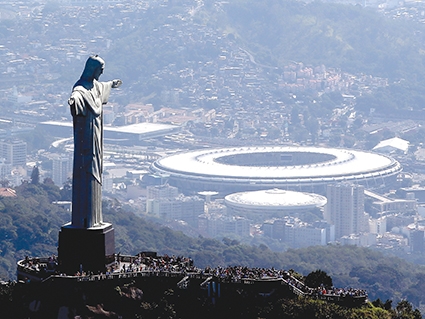Learning the Lingua: Rio is Rio but Definitely not London
OPED
The Olympic Games have become a regular, once-every-four-year routine of the world – an extremely happy and joyous routine, too, as well as very expensive. I am lucky enough to have attended a couple of them in my lifetime, having noticed that all of them look and feel the same if they are done well, and are different from each other if compared in terms of faults and drawbacks.
And I think Rio 2016 has distinguished itself very clearly with its dumbest-ever army of volunteers. They are simply unbelievable in their inability to be of any use at all. Ask a question on the territory of the Olympic Park and you get either a wrong answer or no response. That’s exactly how the system of information works here – yes, I am here! – at Rio 2016 through the brain and tongue of its volunteers.
Don’t waste your time asking those volunteers a question- just glance at their passive, confused and lost faces and keep walking. If you accidentally make a mistake and try to find out where to go and how, you’ll end up in trouble because you are sure to be pointed in the wrong direction. These kids leave the impression that nobody has ever taught them anything, and because they have most probably received no special Olympic training, any regular ticket holder might know just as much as they do. Maybe more!
I do not know how many Olympic journalists would uphold the topic but, personally, I could not help noticing it. Frankly, I have never seen anything more ridiculous than the kind of help that is being provided by Brazil’s young men and women in the capacity of Olympic volunteers.
The world is full of information about the Olympic results. Thanks to the internet and the world’s television capability, you don’t have to be in Rio de Janeiro to be as informed as those physically rooting and chanting in various arenas. This is why I’m not wasting time on filling my current piece with new names and figures. It would be too simplistic to copy them from those endless info sources. I would rather go for something humanly more valuable and interesting – impressions, emotions, curiosities.
And the volunteers’ saga is one of those. One of the reasons the volunteer force is permanently at a loss – in addition to zero preliminary training – should be complete absence of knowledge of the English language in the country. Upon my arrival here, I had to grab a Portuguese self-learner to acquire at least a smattering of the local lingua, and I think I have helped myself a lot. I remember our boys and girls working as volunteers at the Tbilisi-2015 European Youth Olympic Festival: smart, quick, beautiful and informed, and almost all of them speaking English. A comparative analysis between this and that culture would take us too far way, so I’ll stay away from it this particular time.
In a word, English here – in the Games – is as crippled and incomprehensible as it can get, which is more than a little inconvenience, to tell the truth. I just wonder if learning a minimum tongue of communication and skills for giving directions as part of Olympic training, made sense or not to the Games’ organizers who I’m sure are terribly proud of the job they have managed to do.
Conclusively, I am certainly getting nostalgic for the logistical comfort I enjoyed in the London Olympics four years ago. And the British volunteer force – what an exquisite and well-versed and trained team of hosts! Feeling at home when you are away from your natural habitat means a lot. Do I feel at home in Rio like I did in London? No, I don’t! I only know that I’m at the 31st Olympic Games which would make anybody happy to be part of. And inconveniences aside, I’m very happy to be here.
Nugzar B. Ruhadze












